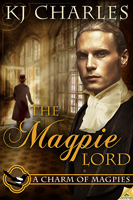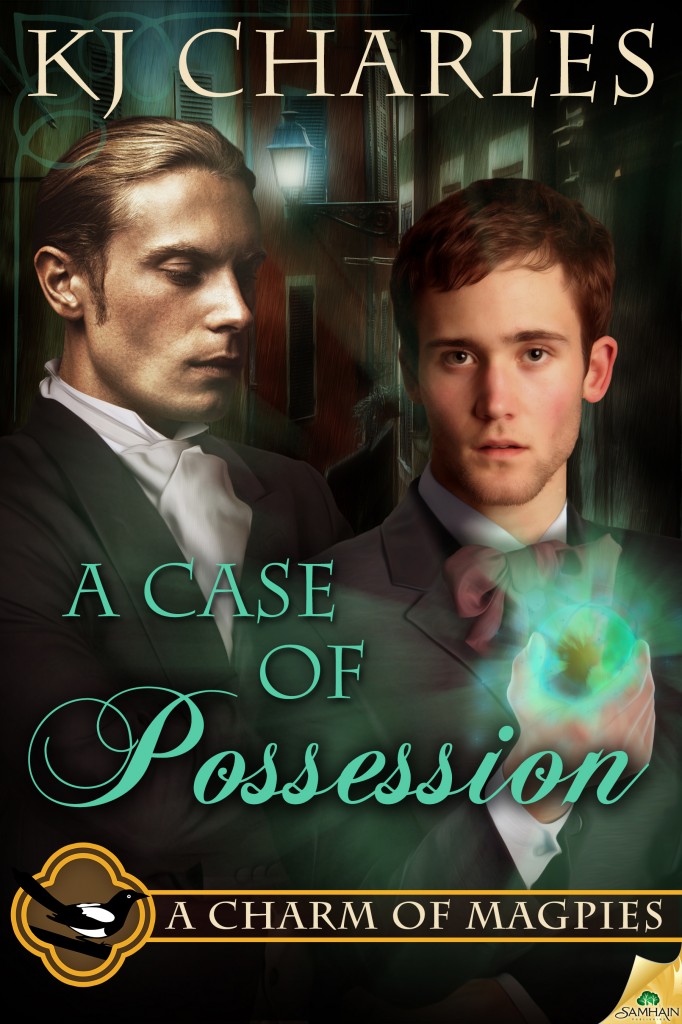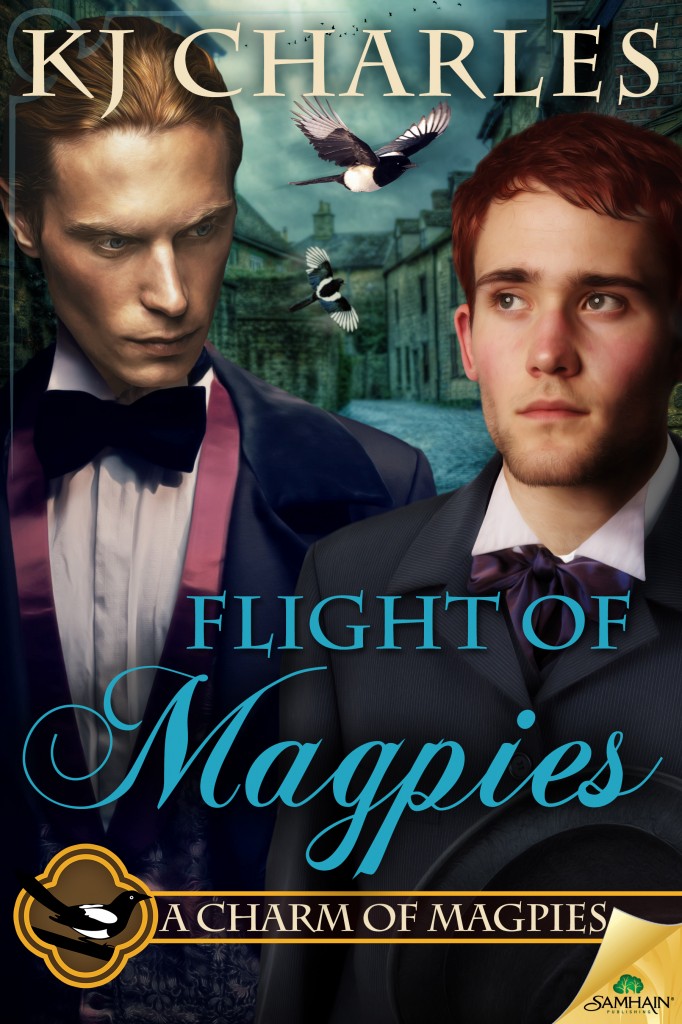 Series featuring the same main characters are a funny thing in romance. If book 1 ends with a HFN at least, and every book increases the sense of the protagonists having found their perfect mate, then at some point the author is going to be introducing problems that may seem artificial or perverse just to get some tension back into the relationship. Equally, if the difficulties within and around the relationship continue for too long, the reader may well feel that possibly these people would be better off apart, or at least that they’re never going to be terribly happy together.
Series featuring the same main characters are a funny thing in romance. If book 1 ends with a HFN at least, and every book increases the sense of the protagonists having found their perfect mate, then at some point the author is going to be introducing problems that may seem artificial or perverse just to get some tension back into the relationship. Equally, if the difficulties within and around the relationship continue for too long, the reader may well feel that possibly these people would be better off apart, or at least that they’re never going to be terribly happy together.
There are some authors who get over this with (what at least looks like) careful plotting of the series from the start. Joanna Chambers’ Enlightenment trilogy is a superb example. Book 1 ends with…not even a HFN, but a sense of something important learned; book 2 takes us to a HFN; book 3 brilliantly pulls together the subplot from the first books to give us the apparently impossible HEA. It’s a terrifically crated trilogy, and it is a trilogy; you don’t finish it clamouring for book 4, no matter how much you love Murdo and David. That’s their story tied up.
But committing to a whole trilogy about the same characters is a pretty big thing for author and publisher. If book 1 tanks, you’re stuck with two more to publish. If you pull book 3 because of that, your small group of fans who did like 1 and 2 will be justifiably furious. So in many ways it’s easier to write open-ended series, where you can keep the story going without committing to a certain plot arc or number of books, and stop when you run out of story, or out of sales.
And yet, and yet. Because can you write a series without an overall story arc? Can you write several romances about one couple and make them each individually satisfying, staying true to the characters and their connection, while keeping up the levels of tension and conflict? And if not, when does the law of diminishing returns kick in? Josh Lanyon’s Adrien English series amps up the levels of Adrien and Jake’s relationship in a very daring way, including separating them completely for a large chunk of the series, so that we’re frequently in grave doubt of a HEA in books 1-4, and totally convinced of it by the end of book 5. It’s a brilliantly planned arc over five books. A book 6 would be incredibly hard to pull off without damaging that equilibrium and reintroducing all the reader’s fears and doubts. It would certainly have to start a new and completely different story arc to work.
 I am not a brilliant series plotter. Okay, I’m not a series plotter at all. I didn’t plan to write a sequel to The Magpie Lord, I just did it because I knew where the story was going next and I wanted to read it. Having written A Case of Possession, I spent an unreasonable amount of time trying out new plot ideas for book 3 before I realised I couldn’t just wing it. I needed, at this point, to know exactly how many books this series would play out over, what each one would tell us about Stephen and Crane’s relationship, where the various issues between them would lead and how they’d be resolved. And I needed to know that before writing another word.
I am not a brilliant series plotter. Okay, I’m not a series plotter at all. I didn’t plan to write a sequel to The Magpie Lord, I just did it because I knew where the story was going next and I wanted to read it. Having written A Case of Possession, I spent an unreasonable amount of time trying out new plot ideas for book 3 before I realised I couldn’t just wing it. I needed, at this point, to know exactly how many books this series would play out over, what each one would tell us about Stephen and Crane’s relationship, where the various issues between them would lead and how they’d be resolved. And I needed to know that before writing another word.
And, when I sat and thought, I realised that my early drafts and plots with another adventure weren’t working because they didn’t fit in the story arc that I’d created over the first two books. That took a natural shape, and Flight of Magpies had to continue that shape, tie up various plot points from the first books, and reach the logical conclusion of the romantic relationship. Everything I’d done that didn’t take the overall story arc into account was wasted, and led to a story without any depth to it, because while it had plenty of other plot, the romantic development wasn’t happening properly.
Other people may be able to spread out stories over multiple books without planning, while staying true to the characters and keeping the story convincing and satisfying. More power to their elbows. I’ve learned I can’t.
 So Flight of Magpies will be the final book of the Charm of Magpies trilogy (though Stephen and Crane will turn up again elsewhere). And the sequel to Think of England that I’m currently writing will be part of a planned story arc, and I’ll know exactly how long that will be and how the romance will develop through it and when we move from HFN to HEA before I write another word. Because it’s only real life where you just keep on keeping on, as one damn thing happens after another. In romance, we expect better.
So Flight of Magpies will be the final book of the Charm of Magpies trilogy (though Stephen and Crane will turn up again elsewhere). And the sequel to Think of England that I’m currently writing will be part of a planned story arc, and I’ll know exactly how long that will be and how the romance will develop through it and when we move from HFN to HEA before I write another word. Because it’s only real life where you just keep on keeping on, as one damn thing happens after another. In romance, we expect better.
___________________________________________________
Flight of Magpies is out 28 October from Samhain. KJ Charles can be found on Twitter @kj_charles or blogging here.

…though Stephen and Crane will turn up again elsewhere.
Now that’s a tease!
Really interesting observations though – I didn’t realise Joanna Chambers’ first book was a Book 1, and was left feeling a bit short-changed at the end. Knowing Book 2 was a middle book in a trilogy set my expectations at the right level re the ending.
Li
Ahaha I didn’t mean to tease. (Much.) There’s a villain in flight of Magpies who gets his side of the story in Jackdaw, coming Feb. https://www.goodreads.com/book/show/22885333
Excellent post! This is something I’ve given a lot of thought to as well, because we’ve seen so many authors extend their series on and on and on ad nauseam (ahem, Anne Rice), often to the point where credulity is strained and the plot distorted (especially in fantasy, ahem Robert Jordan). I know it’s hard for both readers and authors to let go of beloved characters, but it really is a law of diminishing returns to keep series chugging on fumes for book after book.
One of the techniques that’s struck me as a winning formula that lots of authors employ is to create a world, and then each story involves a different couple within that world. Characters from previous books can make reappearances, or even have substantial subplots, but the main plot is always involves a new pairing.
Still, I think it depends on the genre that you’re writing. Couples who solve mysteries or are spies or investigators of some sort can get more mileage as a solid, established couple with problems specifically related to their backstories and each case.
But I am in agreement with you that there needs to be a concrete ending at some point (though I will miss Stephen and Lucien!). It’s wonderful that you acknowledge this and write towards it.
Can’t wait to read the last chapter in their story!
I think there’s probably a lot to be said for a world with multiple characters, rather than extending one pair’s arc too far. Although that can bring its own problems (eg the small town/FBI department/extended family where virtually everyone seems to be LGBT, somewhat against the laws of probability).
Definitely crime/thriller/paranormal investigators (like Jordan’s Whyborne & Griffin) can have a much longer arc because you have more going on, of course.
I think one of the big things for writing a long form series is to have a clear understanding of the what the theme is versus what it’s about. If you stick to your theme and keep everything hooking back into that, what it’s *about* can change and mutate over time.
That’s a really interesting way of looking at it. In fact, I think ‘digging out your theme’ may be another blog post in itself. Or writing book, come to that.
It’s odd… now that you’ve made think on it, I don’t really see your boys and Griffin & Whyborne and their like as strictly romances. Adventure and mysteries that just happen to feature a romantic relationship in various stages. They’re like the Amanda Peabody books, for instance, and the Thin Man movies with Nick and Nora Charles. Or even the JD Robb kajillion books. 🙂
And thank you so much for… “Although that can bring its own problems (eg the small town/FBI department/extended family where virtually everyone seems to be LGBT, somewhat against the laws of probability).” … that bugs me so much! I thought I was alone in seeing it as problematic and illogical. Even though some of my favourite authors do it. *sigh*
I’m working on the third of a trilogy now (and a novella spin off from it!) and I did a very (very very) long series back before I was writing for submission. That one is where I learned how to do it. That was in shortish episodes, most around 12-15k. At first I was making it up on the fly, not expecting to write 3/4 of a million words about these guys!
Later when I realised where I wanted them to end up I roughed out an outline of the rest of the series. Not to the point I knew exactly how each episode would go. I tended to have fairly detailed plans for the next couple and it was more vague further out.
The key advantage of having that plan was to set things up to bite the characters in the ass down the line. And just generally start building the conditions for things that I wanted to happen later to come about. Oh that was fun. But I always kept things flexible, and I still do now, because how something turns out is rarely exactly how it was planned.
One of the key things I figured out was not to be repetitive. To make sure that every episode changed the relationship, and the next one would have them acting in accordance with that change – for the good or for the bad. Not just going over the same ground over and over.
I’ve gotten burned a few times reading series and try to avoid most of them now. If I do read them, I wait until the final book is out before I buy any of them. I’ve been waiting over three years for the final books of some trilogies and have to assume the authors decided not to finish them so I’m left hanging off the cliff.
I prefer that any series finish one couple and have secondary characters continuing as MCs in the next. The exception would be suspense and mysteries that don’t have romance as the main story.
I wholeheartedly agree that I think authors should have a clear plan about the arc especially on romance. If it’s not better to end it. I have several ‘mainstream’ M/F romance series that has been going on but mainly I also think because it falls into urban fantasy series, which means there are something else bigger than the romance happening. For example, Ilona Andrews “Kate Daniels”. Kate and Curran are pretty solid but there’s this bigger arc that has been set-up since book 1.
Some of the issues I find in MM especially about sequel, sometimes I feel like it’s not necessary. Like, in the beginning, the author doesn’t even know that there’ll be a sequel except readers asking that it should be more. As a result, the sequel ends up feeling, well, not worth it.
SO, book 3 is the final one huh. Good. I enjoyed reading it (I got an arc, thank you) and I thought you ended it at the right moment.
One of the potential problems for authors could be that fans will always want more. I AM clamouring for ‘Enlightenment 4’ just because I want more of those characters I’ve come to love, despite being perfectly happy with their HEA in book 3. It’s an impossible demand, I know, I want a HEA yet I still want more adventures, cancelling out the HEA. I’m sure you’ll be getting emails from fans begging for more Stephen and Crane (and I’ll probably be one of those fans) just like I will be begging for more Whyborne & Griffin if the series ever were to end.